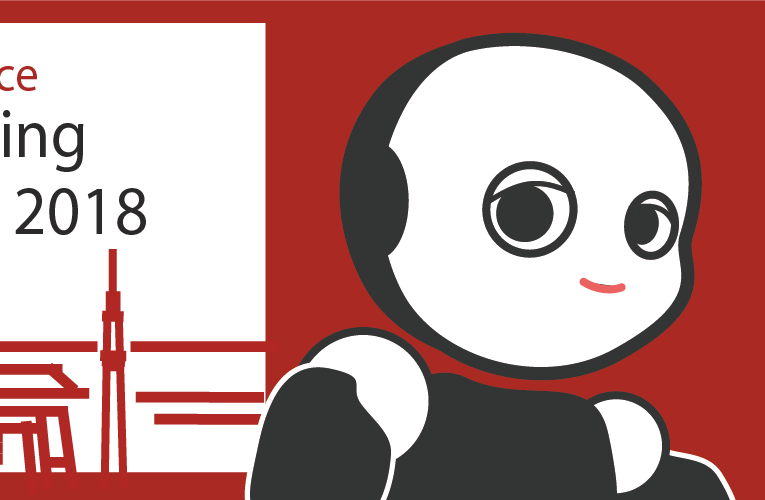Aim and scope | Invited speakers | Program | Registration | Call for papers | Organizers
| Date | Monday, September 17th, 2018 |
|---|---|
| Place | Waseda University, Tokyo, Japan |
This workshop will be held during ICDL-EpiRob 2018.
Poster abstract submission is closed.
Aim and scope
The mechanisms of cognitive and developmental processes in humans are still far from being understood. It remains a mystery how our brain manages to integrate high-dimensional sensory information from various sources in order to act and interact in a highly volatile environment. The amount of processing that our brain performs on an unconscious level becomes especially noticeable if the development of these mechanisms is atypical. Subjects with developmental disorders such as autism spectrum disorder (ASD) experience various difficulties in everyday life, particularly in social interactions. The causes are assumed to lie with atypical perception as well as differences in cognitive processing during the course of development.
In order to provide assistance for people with developmental disorders, it is crucial to understand more about the underlying mechanisms of cognitive and social development. In recent years, a number of novel approaches emerged for explaining differences in cognitive processes, for instance, in terms of Bayesian inference. By replicating behavioral difficulties of people with autism in computational models or robots, or by studying the interaction patterns of children with ASD in interaction with a robot, possible mechanisms of cognitive development can be identified and systematically evaluated. The understanding we can gain from such experiments can help to overcome difficulties in communication between people with and without such disorders.
Another pathway for providing assistance for people with developmental disorders targets at developing assistive technology directed specifically toward ASD subjects, offering them assistance in understanding and participating in social interactions, or allowing them to train and explore interaction skills in therapy with a robot.
This workshop focuses on these two ways of how to assist people with developmental disorders, and discusses what we can learn from these studies about cognitive development in general. To connect and reflect these ideas, insights from developmental psychology, cognitive sciences, robotics and computational modeling are taken into account, as well as the perspective of people with ASD themselves (“Tojisha-Kenkyu”).
Invited speakers
Program
| 09:15-09:30 | Welcome and introduction (Anja Philippsen) |
|---|---|
| 09:30-10:10 | Talk Shinichiro Kumagaya: “Toward Democratization of Science and Medicine – Introduction to Tojisha-Kenkyu (user-led research) on Autism Spectrum Conditions” |
| 10:10-10:50 | Talk Thusha Rajendran: “HRI as privileged window into developmental conditions” |
| 10:50-11:10 | Coffee break |
| 11:10-11:50 | Talk Tony Belpaeme: “Social robots for healthcare: lessons from the frontline” |
| 11:50-12:10 | Short talks (Poster presentations) |
| Lunch break (12:10 – 13:30) | |
| 13:30-14:30 | Poster session |
| 14:30-15:10 | Talk Yasuyo Minagawa: “Development of social interactive brain: Behavioral and neurocognitive evidence” |
| 15:10-15:50 | Talk Alexandre Pitti, Sofiane Boucenna: “The robot as tool to understand and assess human interaction” |
| 15:50-16:10 | Coffee break |
| 16:10-17:10 | Discussion |
| 17:10-17:30 | Conclusions and farewell (Yukie Nagai) |
Registration
For information about registration for this workshop please refer to the ICDL-EPIROB website. Note that there is the option of “workshop only registration”.
Call for papers
We invite the submission of short papers (2-4 pages incl. references) about ongoing work from various research fields with the goal of fostering interdisciplinary discussions. Topics of interest include, but are not limited to:
– Computational models of human cognition and development
– Theoretical models of human cognition and development
– Robot therapy and assistance for people with disorders
– Behavioral or neurocognitive studies on developmental disorders or typical development
– Predictive coding
– Tojisha-kenkyu (self-study of people with disorders)
Papers should be 2-4 pages incl. references, following the template of the main conference (pdf, IEE two-column format: http://icdl-epirob2018.ogata-lab.jp/submission/) and submitted via EasyChair: https://easychair.org/conferences/?conf=udd18
[View the call for papers on EasyChair]
All accepted papers will be presented during the poster session and in spotlight talks.
Submission deadline: August 27, 2018
Notification of acceptance: September 3, 2018
Workshop day: September 17, 2018 (full day)
We are looking forward to seeing you at the workshop!
Organizers
-
- Anja Philippsen (National Institute of Information and Communications Technology, Japan)
- Yukie Nagai (National Institute of Information and Communications Technology, Japan)





